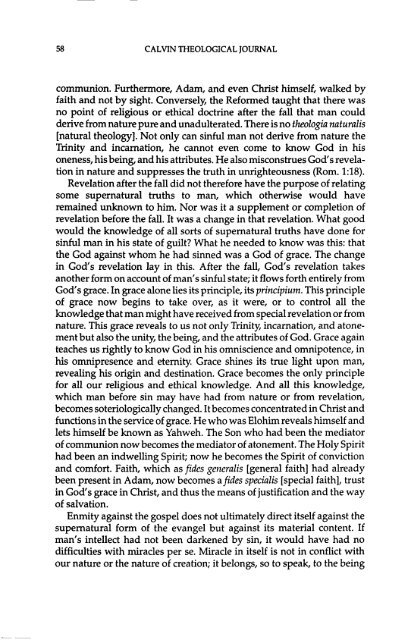Herman-Bavinck-Common-Grace
You also want an ePaper? Increase the reach of your titles
YUMPU automatically turns print PDFs into web optimized ePapers that Google loves.
58 CALVIN THEOLOGICAL JOURNAL<br />
communion. Furthermore, Adam, and even Christ himself, walked by<br />
faith and not by sight. Conversely, the Reformed taught that there was<br />
no point of religious or ethical doctrine after the fall that man could<br />
derive from nature pure and unadulterated. There is no theologia naturalis<br />
[natural theology]. Not only can sinful man not derive from nature the<br />
Trinity and incarnation, he cannot even come to know God in his<br />
oneness, his being, and his attributes. He also misconstrues God's revelation<br />
in nature and suppresses the truth in unrighteousness (Rom. 1:18).<br />
Revelation after the fall did not therefore have the purpose of relating<br />
some supernatural truths to man, which otherwise would have<br />
remained unknown to him. Nor was it a supplement or completion of<br />
revelation before the fall. It was a change in that revelation. What good<br />
would the knowledge of all sorts of supernatural truths have done for<br />
sinful man in his state of guilt? What he needed to know was this: that<br />
the God against whom he had sinned was a God of grace. The change<br />
in God's revelation lay in this. After the fall, God's revelation takes<br />
another form on account of man's sinful state; it flows forth entirely from<br />
God's grace. In grace alone lies its principle, its principium. This principle<br />
of grace now begins to take over, as it were, or to control all the<br />
knowledge that man might have received from special revelation or from<br />
nature. This grace reveals to us not only Trinity, incarnation, and atonement<br />
but also the unity, the being, and the attributes of God. <strong>Grace</strong> again<br />
teaches us rightly to know God in his omniscience and omnipotence, in<br />
his omnipresence and eternity. <strong>Grace</strong> shines its true light upon man,<br />
revealing his origin and destination. <strong>Grace</strong> becomes the only principle<br />
for all our religious and ethical knowledge. And all this knowledge,<br />
which man before sin may have had from nature or from revelation,<br />
becomes soteriologically changed. It becomes concentrated in Christ and<br />
functions in the service of grace. He who was Elohim reveals himself and<br />
lets himself be known as Yahweh. The Son who had been the mediator<br />
of communion now becomes the mediator of atonement. The Holy Spirit<br />
had been an indwelling Spirit; now he becomes the Spirit of conviction<br />
and comfort. Faith, which as fides generalis [general faith] had already<br />
been present in Adam, now becomes a fides specialis [special faith], trust<br />
in God's grace in Christ, and thus the means of justification and the way<br />
of salvation.<br />
Enmity against the gospel does not ultimately direct itself against the<br />
supernatural form of the evangel but against its material content. If<br />
man's intellect had not been darkened by sin, it would have had no<br />
difficulties with miracles per se. Miracle in itself is not in conflict with<br />
our nature or the nature of creation; it belongs, so to speak, to the being



